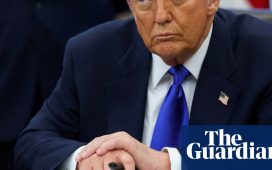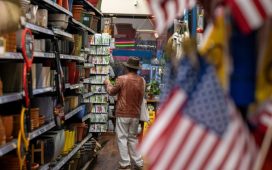Welcome back to Trade Secrets and all good wishes for 2025. Though I’ve long been too humble to make firm predictions in such a chaotic world, I was at least going to do the regulation “what to watch for in the year ahead” today. But with President Joe Biden last week blocking the Japanese company Nippon Steel’s bid for US Steel, I feel moved to perform a requiem for friendshoring, that abandoned orphan of Bidenomics. So my guide to 2025 will come next week. Charted Waters is on US stock prices. My question for you this week: I made a tentative prediction that 2025 would end with Donald Trump having put tariffs of at least 10 per cent on at least half of US imports. Will I be right? Email me at alan.beattie@ft.com.
A bad idea . . .
It wasn’t exactly entirely unpredictable — some of us predicted it — that “friendshoring”, also known as “allyshoring”, the act of steering trade and investment to geopolitically like-minded countries, would struggle on two fronts. One, deciding which countries were friends. Two, and more importantly, competing with the myriad other conflicting goals of Biden’s trade and industrial policy, including but not limited to creating manufacturing jobs at home, establishing a US lead in high-tech sectors, promoting the green transition and propping up America’s steel industry.
Still, some of us were also moderately hopeful that Biden’s long history as an alliance-builder in international relations might weigh reasonably heavily in the balance. That’s where we were largely wrong. When it came down to it, steelmakers were prioritised above all. As a unionised industry located in electoral swing states (Pennsylvania and Wisconsin) with tariff protection inherited from Donald Trump and national security and environmental rationales, however specious, they ticked too many boxes to ignore.
True enough, Biden did suspend the steel and aluminium tariffs of 25 per cent and 10 per cent respectively on imports from the EU, but only temporarily and in return for a complicated quota system that left European exporters struggling to access the US market anyway. That truce will expire in March, and you’d be highly optimistic to imagine that Trump will happily extend it without seeking more concessions — or just slapping the full tariffs back on no matter what.
And now, though we’re almost on the eve of the Trump administration and Kamala Harris lost Pennsylvania in the election, Biden has decided to deliver one more symbolic strike in favour of the steel industry by blocking Nippon Steel’s takeover of US Steel. The decision had split the inter-agency screening body Cfius (the Committee on Foreign Investment in the United States) and went against the advice of several of his administration’s most senior officials.
. . . that doesn’t even make sense
I say “symbolic” because the truly bizarre thing about this decision is that it doesn’t even make sense on his terms, as Nippon Steel and the Japanese government have pointed out. The management of US Steel is in favour of the deal, saying they need the investment that Nippon’s money will bring. Officials from the local branch of the USW steelworkers’ union are in favour of the deal, saying it will preserve jobs. The Treasury, Pentagon and state department — the agencies actually charged with preserving national security — didn’t object to the deal when it came before Cfius.
The main objectors were Katherine Tai, the US trade representative, and Dave McCall, the president of the USW, who has come in for some pretty choice public criticism. The USW leadership has long been close to Cleveland-Cliffs, a rival company that has attempted to take over US Steel.
All politics is local, including trade politics, but the politics here is quite weird. It’s surreal that the geopolitically important practice of friendshoring is being sabotaged by a USTR with no specialism in national security and a union leader both acting in defiance of colleagues who are closer to the issues at hand. Tai’s obsession with the steel industry has extended to sending groups of USTR officials on tourist trips to do photo-ops with steelworkers. This is vibes-based trade policy backed up by show-and-tell.
By contrast, the chief proponent of friendshoring in the administration was Treasury secretary Janet Yellen, and it’s notable that her department was engaged in one of the administration’s most significant efforts in the area. Congress passed the Inflation Reduction Act in 2022 with its infamous local content requirements for tax credits to buy electric vehicles. But it was the Treasury, through its stewardship of the IRA’s implementation, which cleverly managed to punch holes in those rules to allow European and Japanese car manufacturers to benefit by leasing cars rather than selling them.
Successful historic episodes of using trade to make and keep foreign policy friends have involved facing down domestic opposition. The Marshall Plan after the second world war and the creation of an outward-looking transatlantic foreign policy involved defeating the isolationist tendency in US politics. Ronald Reagan’s administration took very strong action against particular imports from Japan (cars and semiconductors) but didn’t stop Japanese carmakers’ foreign direct investment in the US. It also drove forward the Uruguay Round of trade talks and created the World Trade Organization.
When it came to it, it wasn’t the substance but the vibe of protecting the steel industry that prevented the Biden administration giving friendshoring a fair go. It’s a sad end for a respectable but ultimately unloved idea.
Charted waters
Despite everything (or at least despite everything that’s come so far) US stocks have outperformed those of other big economies.

Trade links
Geoffrey Gertz at the Center for a New American Security think-tank says that the “small yard, high fence” mantra for US export controls on technology was another Biden administration geoeconomics idea that didn’t perform well.
A Wall Street Journal analysis posits that China has limited capacity to hit back at any tariffs imposed by Trump.
In a somewhat contrasting argument, Evan Medeiros, a former senior official in Barack Obama’s administration, argues in the FT that China cannot only retaliate but also adapt and diversify in response to Trump.
Eric Boehm in the libertarian magazine Reason lays out the role played by environmentalists in blocking the Nippon Steel-US Steel deal.
A member of Team “Nobody Knows Anything”, FT markets legend Katie Martin says that investors have no clue what Trump is going to be up to, leaving them “blindfolded and tiptoeing around rakes”.
Writing in Foreign Affairs, Daniel Rosen, Reva Goujon and Logan Wright of the Rhodium Group consultancy argue that China’s economic slowdown has tipped the balance of power in trade disputes towards the US.
Trade Secrets is edited by Jonathan Moules









